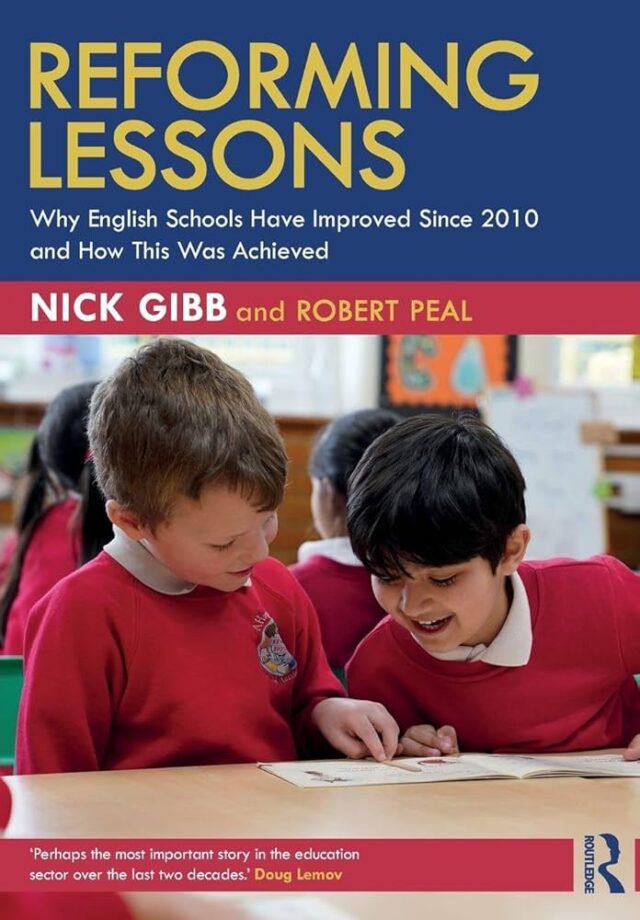Blog
Some thoughts on Reforming lessons

Dr Simon Hyde
HMC Chief Executive
Read the blog
One of the few advantages of a 10-hour flight is the opportunity to read, and to do so relatively undisturbed by the routine business of one’s working life.
So, a recent flight was the perfect opportunity to get to grips with Nick Gibb and Robert Peal’s Reforming Lessons, the former Schools Minister’s fascinating reflection on the period from his appointment to the Education Select Committee to his time in government. At once a memoir and a manifesto, the book will fascinate both those interested in the science of government and the politics of education.
What follows is not a review of the book. If you want that, it is ably done by many others, not least Nick Hillman (English lessons: Review of Nick Gibb’s book on educational reform after 2010 – by HEPI Director Nick Hillman – HEPI) and Jonathan Simons (https://jonathansimons.substack.com/p/welcome-back-and-sir-nick-gibb-and). As a former teacher and historian, I am more interested in what the book has to say about teaching, learning and school improvement. The political science must be left to others.
First, a confession. Despite twenty-five years in the classroom, I never did a PGCE (a teaching qualification). Having read Gibb’s book, I am rather relieved. Knowing my contrarian tendencies, I fear that I would either have failed or grown so frustrated by the social science that I would have given up. My route into teaching was an emergency stint as an A level teacher at Stowe School whilst still a postgraduate student and then a gamble taken by Loughborough Grammar on a novice teacher with little more than reputable academic qualifications.
If you are looking for a research-informed or evidence-led critique, then I advise you to stop reading now as you won’t get one. I am an amateur and I have learned what I know about teaching and school leadership by trying to do them rather than by reading how to. I am not proud of that, nor am I advocating it. It is just the way it was for me.
So, books like Nick Gibb’s are not my preferred mid-flight entertainment. And yet I was hooked. For me, books are dialogue, an opportunity to reflect and ask questions, even if there is little prospect of getting many direct answers. If my schooling taught me anything, it was the importance of questioning. Some call that critical thinking. I wasn’t explicitly or discreetly taught it, but that doesn’t mean that I either couldn’t or shouldn’t have been.
Gibbs’ premise is the stuff of any good adventure story. British state education was broken. Plagued by poor behaviour and progressivist pedagogy, schools were at the mercy of an educational establishment firmly entrenched in local education authorities, teacher training colleges and regulatory bodies. Results were poor, the public disenchanted and a culture of excuses presided to explain or justify underperformance, especially for disadvantaged children. Rampant grade inflation, connived at by government and educators alike, gave an impression of higher standards, but in fact reflected no more than a ‘dumbing down’ of educational outcomes, which had been undermined by coursework and by a ‘race to the bottom’ amongst examination boards more focused on securing market share than high quality assessment.
Enter the 2010 coalition government and our author, Nick Gibb, whose mission it was to unseat the establishment, restore standards and re-win public trust.
Gibb paints a superficially convincing picture. Nevertheless, we must remember his book is not the work of an historian, but of a politician, sometimes a polemicist and always a protagonist. And here lies the interest. Along the way, we gain a fascinating insight into Gibb’s character, a politician in his own words fated always to be ‘the bridesmaid and never the bride’ (Secretary of State). He is impatient, driven, unflexible (telling us that he ‘hated compromising’) and, for a conservative politician, incredibly dogmatic. Despite his disdain for those he identifies as his adversaries, he appears to have a genuine fondness for the teaching profession, and he has perhaps spent longer actually visiting schools than some recent schools’ ministers have been in office.
A man so driven by a sense of mission that he ‘gained something of a reputation for pedantry’ as he scoured departmental documents expunging any trace of what he terms progressivist vocabulary, Gibb cares most about the performance of disadvantaged children. These are the victims, the pupils most let down by progressivism and they explain Gibb’s zeal. His crusade was a serious business, so it will hardly be surprising that I could only find one joke in the book (when he uses a fronted adverbial to introduce a sentence explaining its meaning) and humorous stories are rare (as when visiting a school he discovered a pupil’s disappointment that instead of the Deputy PM Nick Clegg, the guest was ‘some random’ called Nick Gibb).
Overwhelmingly this is a book by a zealot. And that is probably my biggest concern. If we accept the book’s premise (and some will not) that education standards have risen dramatically in English schools over the last decade or so, and if we accept (and many will not) that PISA rankings are the best way to assess this improvement, then we still face key questions of cause and effect.
For Gibb, his mission is a coherent whole, presumably all equally necessary and equally valuable in bringing about his victory. Post hoc, the rationale appears attractive. PISA results for England have improved, whilst elsewhere they have not. Structural reforms (the growth of academies and MATs, Multiple Academy Trusts) have happened. Teacher training has been liberated from the university departments. The English curriculum has been reformed, and many schools have placed a greater emphasis on managing poor behaviour. Comparable outcomes have effectively halted grade inflation (though also robbed us of a means of assessing year on year progress). Woven into this mixture, a number of outstanding schools and educators have been won over by the ideas of E.D. Hirsch, Gibb’s hero, whose ideology is treated with almost Maoist reverence.
Elements of the story strike me as eminently plausible. High expectations and a disciplined learning environment are indispensable if you want to maximise your students’ chances of success. There are, of course, different ways of achieving a ‘disciplined learning environment’ and good teachers will deploy a range means to do so including allowing their charges to have some fun, of which our author seems to disapprove. I don’t think many school leaders will disparage the value of ‘warm-strict’ or the place of a thorough grounding in phonics as an enabler of reading, though I defer here entirely to our wonderful primary specialists. Training teachers in schools rather than in lecture halls is bound to appeal to me, though I admit I am hardly a credible judge.
I am profoundly sceptical that educational improvement is the result of content heavy curricula. There may be exceptions (mathematics?), but the content of a history curriculum bears little relationship in my experience to student outcomes. When I was at university, our English history syllabus was in three parts ‘from the beginning to 1964’, conveniently the year I was born. There was no way, of course, that one could cover this timeframe (literally everything before me) and, as in my A level, one needed to pick a few topics and hope that a reasonable question came up. The nature of the assessment, on the other hand, plays a substantial role in determining outcomes, especially in secondary education. And here we reach probably my greatest point of difference with Gibb: the relative importance of knowledge and skills.
As a historian, of course, knowledge is important, but there is so much of it that no one can master it all. These days, facts can be garnered at the click of a few buttons and there is little real need to recall the composition of Lord Liverpool’s cabinet or the date of the repeal of the Corn Laws (though I do). I have ceased to mind that students don’t know some of the essentials of British history. They never really did. They knew (imperfectly) the bits that were taught to them and that teaching was set in a view of the world that seems far removed from modern day needs.
If history is to have any relevance, it is because of the skills it teaches (imperfectly). I want my students to be able to write well (persuasively, but above all clearly). I want them to interrogate and question. I want them to speculate and to recognise how that takes them beyond the realm of history into a counterfactual world where they have the freedom to think and to learn. We can’t examine that, but that doesn’t mean that I don’t want them to do it. It would be good if they got the date of the Corn Laws right, but I would far rather they understood their significance or the debate around them, and in history there will always be a debate. This is because history is less about answers than questions, something that is perhaps troubling to an accountant.
That said, I do accept the importance of cultural literacy, the real dangers of excluding communities that for whatever reason lack a cultural awareness taken for granted by others. I suppose my response to this problem is different. Rather than attempting the impossible, the establishment of a universally assimilated core of knowledge and context, why not teach awareness of the dangers of cultural exclusion? Surely, we should want to expand the tent rather than pulling its flaps more tightly around those on the inside?
I am profoundly unqualified to engage with the ideas of other of the book’s gurus like Daniel Willingham, though I often wonder (and you will too) how accurately ideas are ascribed to individuals. I do wonder whether debating knowledge and skills is partly a question of semantics. There seem so many blurred lines from my viewpoint that statements like ‘knowledge comes first’ is absurd if applied without an understanding of context. Take for example a lesson on William I’s conquest of England after 1066. One can of course teach it the conventional way looking at what William did and building an understanding of England after Hastings. Or one might approach it theoretically, asking how leaders achieve control over a more familiar institution like a school or club. The ideas generated then can serve as a useful template allowing the students themselves to explore the details of William’s reign and assessing his success.
Having had the opportunity to meet Minkang Kim and Derek Sankey* when visiting schools in Sydney, I am at least aware that so-called ‘cognitive load’ theory should not be accepted wholesale, as no theory should be. Life is more complicated and so is brain science and pedagogy. Long-term memory is important, but I think it contains rather more than facts and working memory seems more plastic than rigid.
Supplanting one orthodoxy (progressivism) with another (Hirschism or the Book of Lemov?) is a dangerous gambit and one I’m not sure Gibb has entirely thought through. Yes, he can select examples of excellent schools led by valiant school leaders who have achieved remarkable examination success in challenging conditions with disadvantaged children. But does that mean we all need to worship at the altar of pedagogical didacticism? Should we ignore excellence produced by other methods, albeit in different contexts? Must we really judge educational outcomes only in terms of momentary examination results? The least bad option is still bad and our capacity to invent new futures is probably the most positive part of our human condition.
There are a few references to the independent sector in the book, which in itself is interesting. Eton, St Paul’s Girls’ and Bedales are mentioned for their support (bad) of Rethinking Assessment, though I could not help but notice that Eton’s excellent examination grades are also used as a benchmark of success when lauding the exceptional results of Katharine Birbalsingh’s Michaela Community School. Disappointingly, Gibb gives credence to the notion that the sector engaged in widespread cheating when grades were assessed by teachers during the pandemic. The idea that other factors might have been at play such as the sector’s rapid move to online teaching, the availability of greater resources and the more extensive exam preparation in a highly supportive home or boarding environment goes unacknowledged.
For such a strong advocate of emulation, beacon schools and sharing good practice, it is disappointing that Gibb did so little to engage with the independent sector when in power. There is such diversity within the sector that it is difficult to believe that he would not have found something of value, but perhaps it was undesirable politically.
One aspect of the legacy, academies and MATs, does however offer some prospect of greater engagement with my sector as partnerships enable local and sometimes regional cooperation as well as joint learning and working even if they are ignored by government. Another opportunity is provided by the explosion of social media, podcasts and the blogosphere, all allowing teachers to speak with teachers and to share the community of evidence-informed practice as professionals engage in action research. This is something that my organisation, HMC (The Heads’ Conference) is keen to support and benefits from input from our excellent schools around the world.
Fans of The West Wing may recall an episode early in President’s Bartlett’s second term when the US economy was faltering and the administration faced a recession (or bagel). Donatella Moss, a junior staffer, is mocked by her boss for suggesting that the best course of action was to take a little from all the economic theories to address the problem, only to vindicated at the end of the episode when that is exactly the response favoured by the President (a Nobel-prize winning economist). I don’t suggest that teaching is entirely that random and certain methods are more attractive to achieve results in some contexts. But I would always favour a fuller toolbox, and I do believe that education cannot be reduced to PISA rankings and league tables as informative as they can be.
Gibb has certainly been the most consequential Schools’ Minister of my career and his achievements are significant. He has co-written an important book that should at least encourage us all to think about education. Whether the recipes prescribed are the right ones for the future, whether they were the right ones for the present or past are all important questions, especially the first one. We must hope that we find someone with the dedication and commitment of Gibb to provide an answer, but perhaps with the wisdom to understand that questions more often than not have answers rather than an answer.
*Minkang Kim and Derek Sankey, The Science of Learning and Development in Education (Cambridge University Press)

Reforming Lessons: Why English Schools Have Improved Since 2010 and How This Was Achieved” by Nick Gibb and Robert Peal can be purchased here with a 20% discount.


